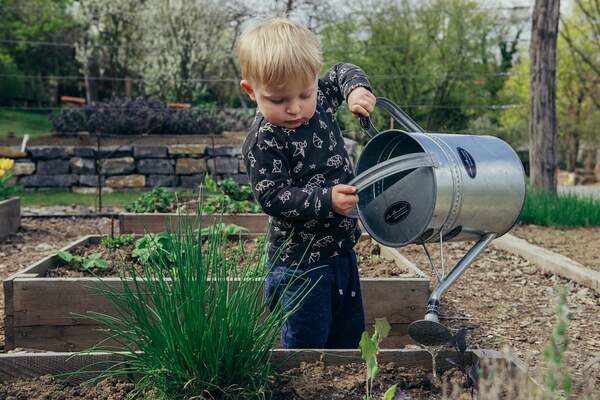How Parents Can Take Part in Their Child’s Eco-Education
Seeing the need of the hour, the United Nations (UN) made a universal call to transform the world in the form of 17 sustainable development goals. This 2030 Agenda for Sustainable Development aims to protect the earth and its inhabitants.
The current situation is still dire. Scientists and environmentalists believe that our precious world is “quite sick” due to ecological pollution. It has entered the danger zone, pushing past seven out of eight scientifically established limits of safety.
The massive shift from an agrarian to a manufacturing economy during the Great Industrial Revolution has impacted the environment. With climate change being a heated topic, every citizen must join hands to reverse the problem.
This includes children, as Harvard University explicitly conveys through its ‘Children are Citizens’ project. However, we need to make environmental concerns relatable to them.
It is not enough that your child learns about environmental issues in their eco-education classroom. They need to engage in real-world participation through their parents. Generally, a child is an observational learner, picking up behaviors through imitation. Since parents spend more time with their kids than other adults, they can directly influence them toward a greener future.
This article will discuss five important reflexes to inculcate in your child so they become an ecologically responsible citizen.
The Daily Economic Reflex: Saving Electricity and Water
According to the US Energy Information Administration, fossil fuel accounts for the largest energy generation source (60.2%). At this rate, the day is not far when our non-renewable energy sources will run out.
What’s even worse is that the US also leads in energy wastage (with electricity wastage being the second leading cause). In an age of heavy tech use, it’s vital to teach your child to conserve electricity (beyond switching off the lights).
You can start by cutting down your own screen time and engaging in fun board games. Teach your child why you choose to do so and encourage them to follow suit. Also, instruct them to unplug a device once completely charged.
You can even turn it into a fun game – ask your kids to compete against each other for the shortest screen time. The same goes for water conservation – who takes the least time to shower? Additionally, let them know the importance of watering plants with water left from washing vegetables, not letting the tap run as they brush their teeth, and so on.
The Must-Have Reflex: Reducing Waste
The three Rs of saving the planet may have become cliché, but they’ll never lose their relevance. The process of ‘Reduce, Reuse, and Recycle’ begins with minimizing waste. It is the easiest to do as there’s no need to reuse or recycle what you reduce.
Let’s use a different take to understand the waste generation scenario of the US. Statista revealed that the US waste management and remediation services market had a net worth of $140 billion in 2022. That is almost double the figures of 2010 ($78.82 billion).
This alone should give you an idea of how urgent the need for waste reduction is. But how can you teach this to your kids? Definitely not through statistics! You can start by letting them see the mountain of trash in a local landfill. As repulsive as that sounds, a strong mental image is a good motivator.
Moreover, let your kids accompany you for grocery shopping to teach them about intentional purchases. This includes preparing a grocery list and sticking to it. Choose fruits and vegetables in reusable bags rather than those available in plastic boxes. Additionally, take the opportunity to educate your children about environmental sustainability by discussing topics such as what is fast fashion and its impact on the planet.
If you’re tempted to buy something impulsively, resist the urge and let your kids know why you won’t need it.
The Solidarity Reflex: Donating Items
The next on the environmental Rs hierarchy is reusing waste materials. This is a method of keeping waste from ending up in landfills. Reuse works best for items with great longevity and a slow decomposition rate.
The first thing that probably comes to mind is plastic. Does your child already own plastic dolls or other toys they’re bored of? Encourage them to donate unused ones to a local charity. Teach them how so many children are not as privileged as they are. Then, you can introduce them to the world of all-natural dolls and toys.
These include soft toys filled with organic hemp or cotton, bamboo or wooden kitchen sets, wooden cars and animals, etc. The same goes for clothes, as textile production is responsible for 8% of global carbon emissions.
If possible, invest in natural fibers like linen and cotton (while teaching your child why). If you have children only one or two years apart, let the garments go down the pipeline. If a child complains that they’re bored with a piece or there are visible spills and stains, sustainably upcycle it.
Some examples include tie-dye, adding or removing sleeves, patchwork, etc. Get your kids involved in the fun process!
The Eco-Conscious Reflex: Recycling What’s Recyclable
Despite reducing and reusing waste, there are times when you must resort to recycling. Providing your child with whatever they want, whenever they want, gives them the impression that resources are limitless.
Making recycling info for children available in relatable ways will help them lead conscientious lives. Start with something simple, say, waste cans or plastic bottles. Gather your kids and engage in a fun DIY project where you convert the waste into beautiful planters.
This will help them realize the multi-purpose of any object and awaken their inner crafters. Other examples of recycled projects include egg carton flowers, a recycled robot, tin can wind chimes, cardboard box organizers, etc.
Install different trash cans in your home for biodegradable and non-biodegradable waste. This will spark your child’s curiosity to learn more about each. If you want, invite your kids to help decorate each bin to segregate the waste.
Follow in the footsteps of the Environmental Protection Agency (EPA) to pack your kids a waste-free lunch. You can also take them on a recycling scavenger hunt where they find items to turn into glamorous art projects. Have competitive children? Make this hunt a race!
The Green Reflex: Loving and Respecting Nature

It’s challenging to raise an eco-conscious child if they have little respect for nature. Creation, in all its glory, is healing to the body and mind. This is why it’s vital to let your kids play in the outdoors daily.
Not just play, allow them to hold the soil in their hands and feel its texture. Also, let them enjoy a few splashes in muddy waters. If they loved playing with leaves and flowers, let them bring home a few to play with later.
Teach kids that everything is connected. The use of non-toxic products in the home greatly protects the environment outside, from time any product is created and manufactured in a production plant, to when they are disposed of down the sink or toilet drain, or into a landfill.
Sadly, an entire generation is apathetic or worse yet, scared of nature. There was a time when kids enjoyed holding bugs in their hands and chasing after butterflies. But all of this seems to be lost now. Repeated exposure to trees, blades of grass, insects, and farm animals will instill a deep sense of reverence for creation.
Furthermore, you can install a bird feeder on one of the trees in the backyard (preferably made using “waste” materials). Plant an herb or vegetable garden, and let your children take part in the process. Watching life grow from tiny seeds is nothing short of a life-altering experience.
On lazy days, just spend time on the patio gazing together at the sunset or watching birds chirp. This is sure to raise some curious questions from your little ones. The more you make nature a part of their childhood, the more they will love and revere it as adults.
A Final Word
Besides the reflexes mentioned above, you must also infuse the healthy reflex into your children. This includes choosing seasonal and organic produce as well as traveling smart. For instance – lead by example and make intentional statements while eating. It could be as simple as, “These strawberries are sweet, delicious, and good for the immune system.”
Help them understand nutrient labels, read books on healthy eating, and have fun with food by introducing healthy rainbow recipes. As for traveling, choose to walk or bicycle wherever possible and explain to your kids the reason behind this choice.
Allow them to accompany you to a run in the woods for exercise and forest bathing. Do not worry about the fact that they’re children. Every child is capable of making healthy and sustainable choices when given the right example.
Reverse socialization, where children help parents to make sustainable choices, is also a real phenomenon. Raise them right, and you don’t have to worry about them going wrong!
Additional Reading: Learn whether or not you can recycle or repurpose a mattress.









